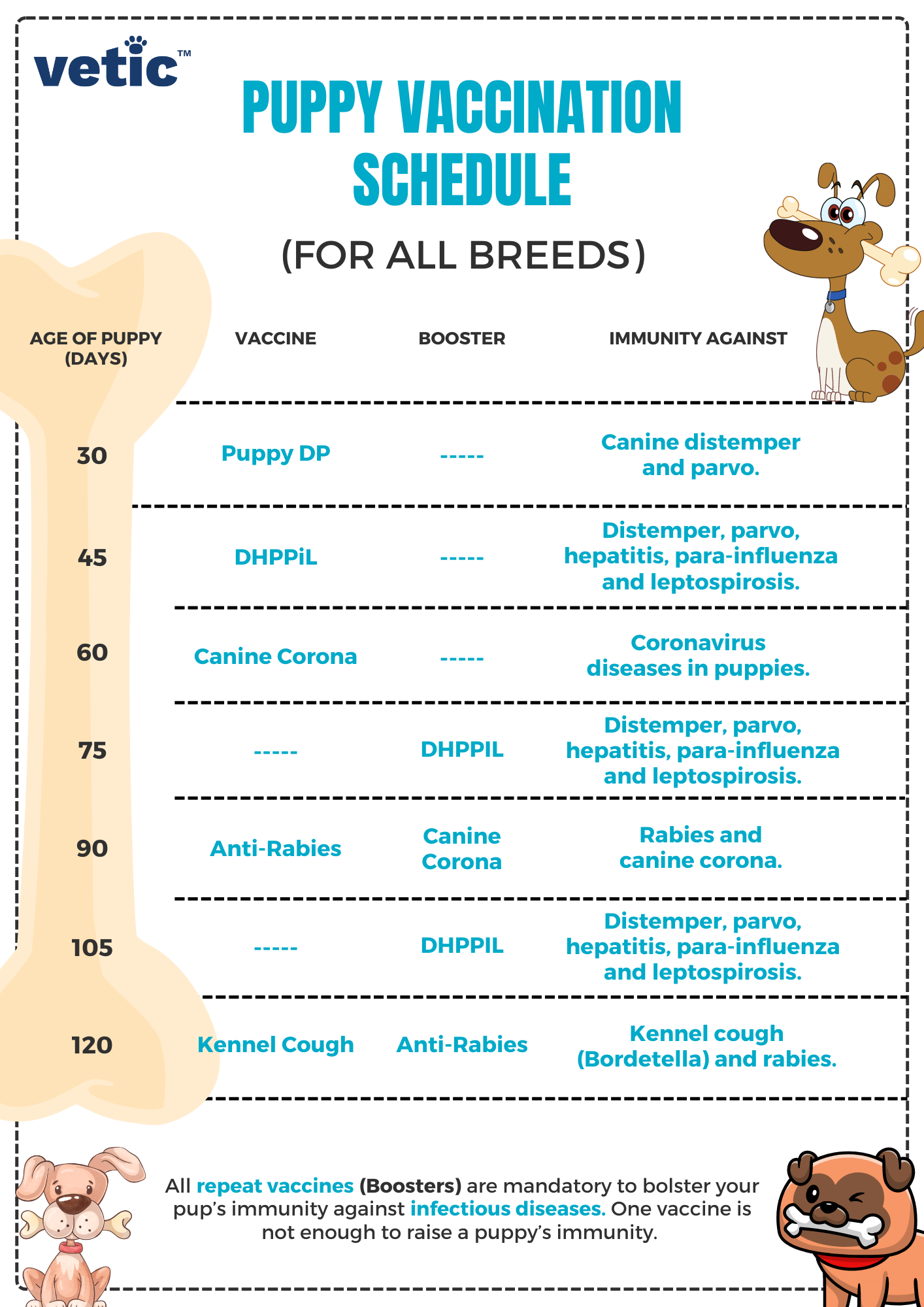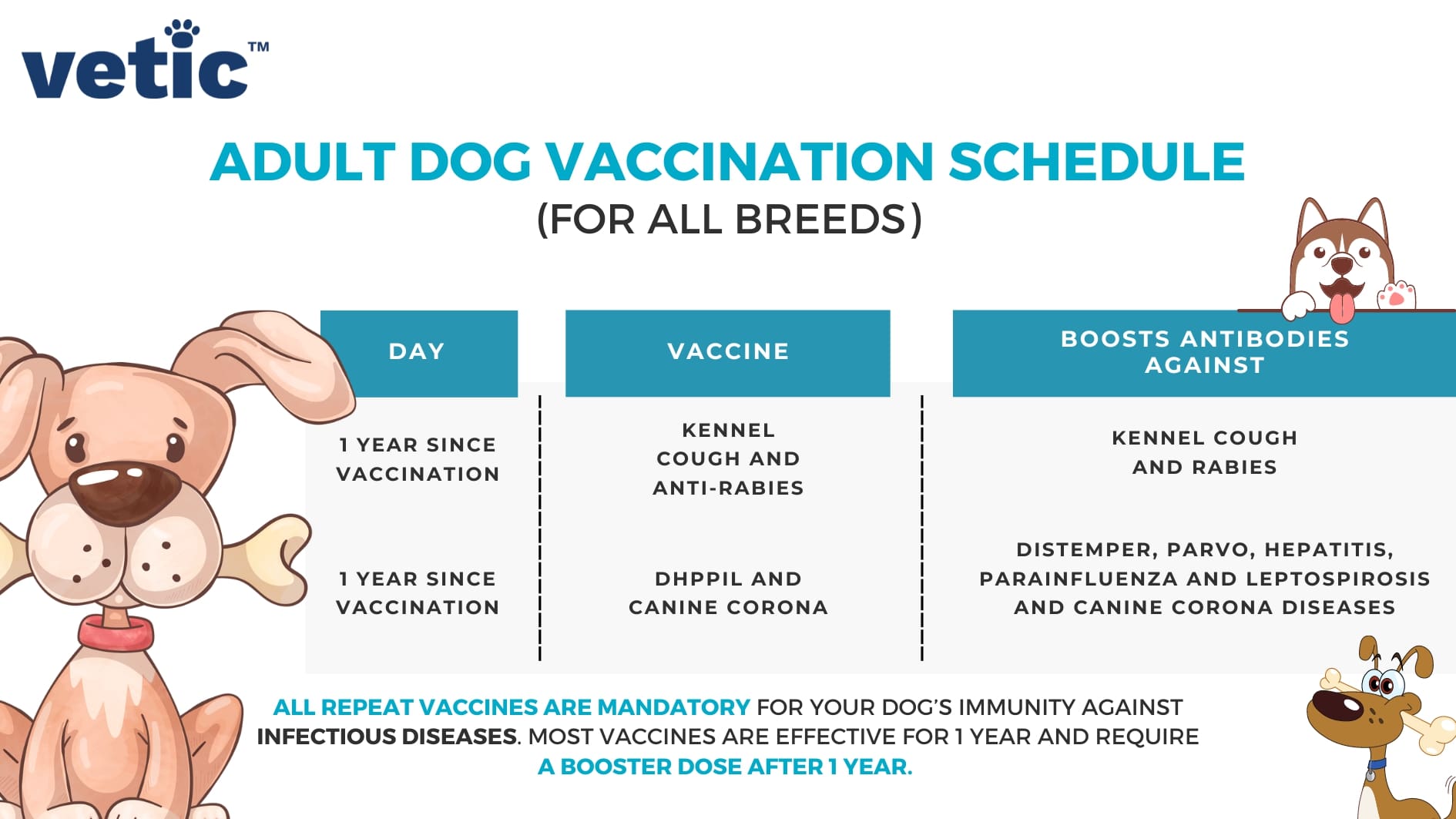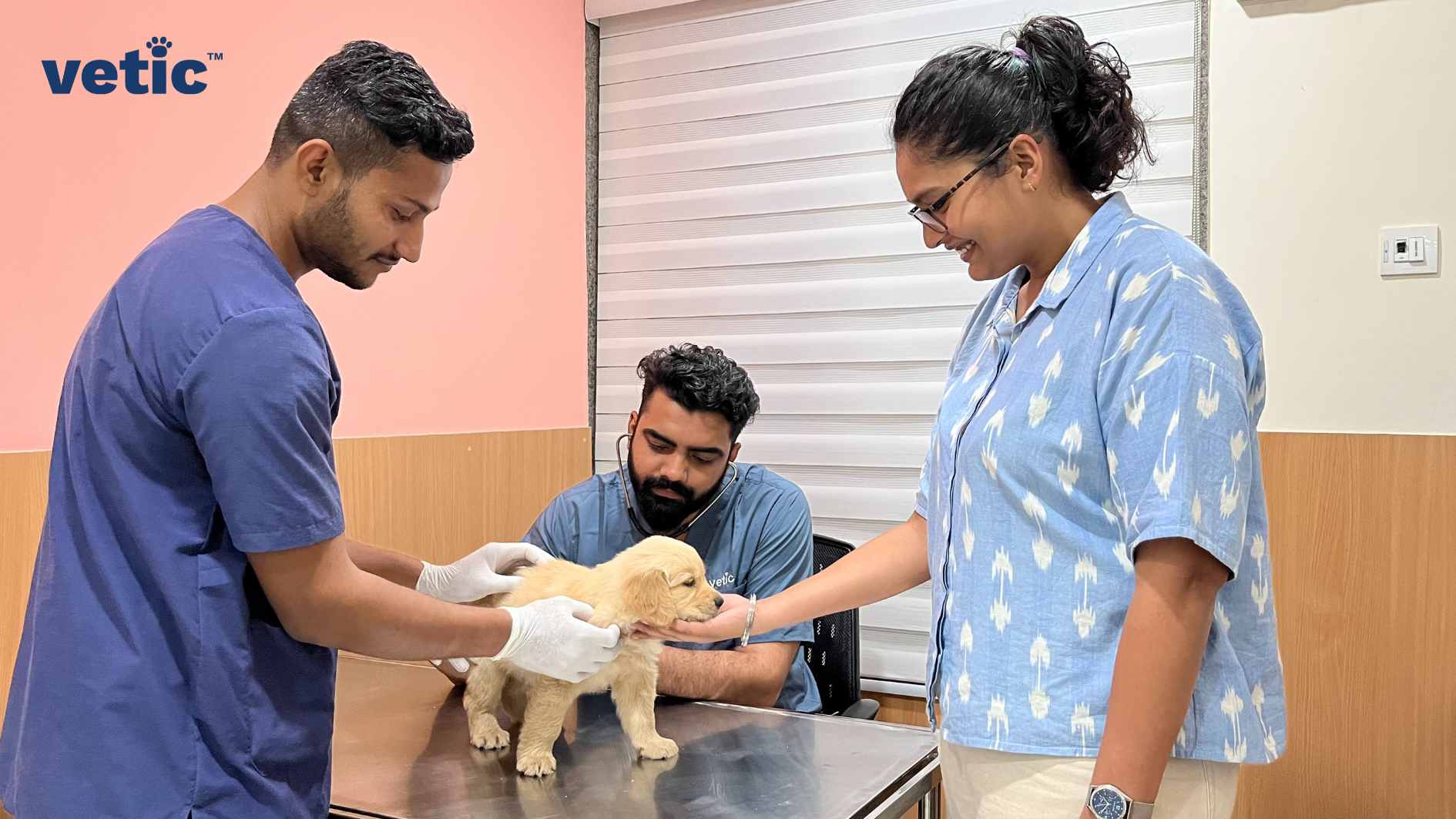The mandatory vaccines for dogs in India can protect your pet dog from highly infectious, incurable or potentially fatal diseases. Even 5 years ago, the occurrences of canine distemper virus (CDV) and canine parvovirus (CPV) infections weren’t as common among household pets. Today, the only way to protect your pup from these infections is by following the dog vaccination schedule properly.
Due to the lack of veterinary facilities during the 2020 lockdown, several pets missed their annual vaccinations and it resulted in a sharp spike in viral infections among household pets across the world.
Sadly, most of these diseases don’t have a cure and even if a dog manages to survive these infections, they have lifelong effects including nervous issues, digestive problems, heart problems, respiratory distress and/or mobility issues.
While many pet parents are concerned about the cost of vaccinations and the recurring cost of boosters, administering the mandatory vaccines for dogs on time is much cheaper than the treatment required for any of the diseases they prevent.
The only way to keep your puppy and dog healthy is by following a proper vaccination schedule. Never miss a vaccination or booster. Even a 10 days delay in vaccination can have serious consequences on your pup’s health. Contact your veterinarian at Vetic Thane or any other location near you to get your pup’s vaccination up-to-date.
Puppy Vaccination Schedule: Mandatory Puppy Vaccines in India
Here are the dog vaccines that your pupper must receive in India –
- Puppy DP/DHPPiL aka 9-in-1 Vaccine
- Anti-Rabies Vaccine (ARV)
- Canine Coronavirus Vaccine
- Kennel Cough Vaccine
Puppy DP And DHPPiL Vaccines For Puppies
Any puppy between the ages of 6 and 8 receives the Puppy DP vaccine. It provides protection against two of the most deadly viral diseases that affect dogs – canine distemper and canine parvo. It is essential since by 6 weeks of age, your puppy’s mother will slowly stop lactating and your puppy will not receive the mother’s antibodies (maternal antibodies) they used to from the mother’s milk.
2 weeks after Puppy DP, the DHPPiL vaccine or 9-in-1 vaccine is given. DHPPiL stands for canine distemper, hepatitis, parvovirus, parainfluenza and leptospirosis. Since puppies do not retain antibodies against any disease for long. The maternal antibodies already present in their system remove the antibodies produced via vaccination.
The 9-in-1 vaccine for pups or dogs provides the pup or dog with immunity against 9 pathogens with just 1 vaccine. The 9-in-1 vaccine contains modified-live or killed canine distemper, parvovirus (CPV), infectious canine hepatitis, parainfluenza, canine adenovirus type 2, Leptospira pomona, Leptospira canicola, Leptospira grippotyphosa and Leptospirosis icterohaemorrhagica.
So, it is absolutely necessary to keep vaccinating your puppy at an interval of 2 to 4 weeks against Distemper, Parvovirus, Hepatitis, Parainfluenza and Leptospirosis (DHPPiL) until they are about 20 weeks old.
Once they have received their final dose of DHPPiL or 9-in-1 vaccine, you need to repeat the vaccine (booster) after 1 year.
Anti-Rabies Vaccine (ARV) For Your Puppy and Dog
Although rabies seems like a far-fetched idea, thousands of dogs get rabies every year. Sadly, rabies has NO cure.
We often tell ourselves that as long as our dogs are not bitten by a feral dog or animal, there is no risk of rabies. Now, rabies is commonly spread through bites. However, it spreads through the contact of the saliva of the affected animal with the blood of the recipient. So, if any infected animal licks a small open wound, there is a good chance of the transmission of the virus.
There is no point taking such a huge risk especially since there is no way to prevent rabies transmission after a bite from an infected animal. Rabies is prevalent in almost all cities of India including Delhi-NCR, Bengaluru and Mumbai. Never skip your dog’s anti-rabies vaccine or delay it without instructions from your veterinarian.
When it comes to rabies, prevention via vaccination is the ONLY way.
Get your pet vaccinated against rabies by the time they are 90 days old. If they received their anti-rabies vaccination when they were younger than 45 days, your pup will require a booster vaccination when they are 90 days old.
For better guidance, please contact your veterinarian at Vetic Thane (Mumbai).

Canine Coronavirus Vaccination For Dogs and Puppies
Canine coronavirus infections are more common than people think. There is a common belief that it is not prevalent in India. The reality is that we didn’t have the diagnostics to confirm canine coronavirus infections up until recently.
Note: canine coronavirus only affects dogs. The virus doesn’t infect people. It is not the same as COVID-19 or SARS-COV2.
It usually presents as digestive distress. It is extremely easy to confuse canine coronavirus infection with canine parvo. It spreads quite easily and rapidly. Eating from an infected food bowl, sniffing infected poop or pee, and licking infected surfaces can cause your dog to become infected. So basically, every time your puppy or dog goes out for a walk, they are at risk of being exposed to canine coronavirus.
The only way to ensure that your dog never gets infected is by getting them vaccinated on time against canine coronavirus.
Kennel Cough Vaccine For Dogs and Puppies
Puppies and dogs are frequently exposed to kennel cough especially when they visit boardings and doggy parks. The name itself states that it can spread quite easily between dogs at kennels.
It is a very common bacterial infection seen in shelters or any other place that houses multiple dogs. It is a very common cause of respiratory problems among dogs in Mumbai.
A loud “honking” cough, runny nose, lethargy, loss of appetite, sneezing and mild fever are all signs of kennel cough. Although treatable, it can result in severe respiratory distress, especially in flat-faced (brachycephalic) breeds.
The best decision is to protect your pup from kennel cough with just one jab. It is a yearly vaccine that protects all dogs against Bordetella (kennel cough) infection.
Mandatory Puppy Vaccination Schedule in India
Here is an easy-to-follow vaccination schedule for puppies of all breeds –

Dog Vaccination Schedule: What are The Mandatory Dog Vaccines in India?
Here is a vaccination schedule for the vaccination of adult dogs –

Wrapping It Up
If you have any questions regarding the vaccination types and schedule, ask us in the comments. Our veterinarians will answer your questions ASAP.
In case you need immediate vaccination or boosters, you can book an appointment with Vetic Clinic in Thane or Andheri via the app directly. The Vetic app also allows you to keep your dog’s vaccination records in one place. No more booklets and brochures! Vetic gives you digital vaccination records that you can carry with you, wherever you go.
Here are some of the commonly asked questions about the puppy and dog vaccination schedule in India:
When should I start vaccinating my puppy in India?
Start vaccinating your puppy at 6-8 weeks of age with the Puppy DP vaccine, followed by DHPPiL every 2-4 weeks.
How often does my dog need a rabies vaccine?
Administer the rabies vaccine by 90 days of age, then booster it annually to ensure continuous protection.
Why is the DHPPiL vaccine important for puppies?
The DHPPiL vaccine protects against distemper, parvovirus, hepatitis, parainfluenza, and leptospirosis, crucial for a puppy’s health.
How do canine coronavirus infections spread?
Canine coronavirus spreads through contact with infected feces, surfaces, or food bowls, making vaccination essential for prevention.
Why is the kennel cough vaccine important?
The kennel cough vaccine prevents respiratory infections, especially in environments with multiple dogs like shelters and parks.
When should I booster my puppy’s DHPPiL vaccine?
Booster the DHPPiL vaccine one year after the final puppy dose, then annually, to maintain immunity.
How can I keep track of my dog’s vaccinations?
Use apps like Vetic to keep digital records of your dog’s vaccinations, ensuring you never miss a booster.
Why are vaccinations cheaper than treatments?
Vaccinations prevent expensive and often incurable diseases, saving on potential high treatment costs and ensuring your pet’s health.
What are the signs of kennel cough in dogs?
Signs include a loud honking cough, runny nose, lethargy, loss of appetite, sneezing, and mild fever. Vaccinate to prevent it.


